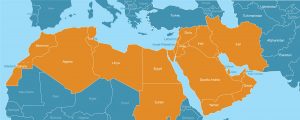Today, the Middle East region is torn by war drifting disintegration. Meanwhile evidence suggests the alternative Arab vision remains largely repressed, unorganized, marginal and hence ineffective. Thus, the downward spiral of the Arabs as a regional force with the 2003 War on Iraq and the balance of influence in the above region shifting to the benefit of Iran, Turkey, and Israel. Additionally, much of the Arab world is in denial after the revolutionary movement of the “Arab Spring,” the policy choices during former President Obama’s era, and the rise of Russia’s role in the Middle East continue to expose the region to further strategic erosion.
by Bob A. Rabboh*

Middle East
In order to comprehend the current situation, it is essential to review the issues from the following perspectives:
First, Trump’s announcement that recognizes Jerusalem as the capital of Israel that overly aligns the U.S with an increasingly expansionist Israel at the expense of the Palestinian peoples lives and rights, and without any regard for democracy is reckless, deeply irresponsible. Significantly, no country in the world has an embassy in Jerusalem today, because the international community doesn’t recognize Israelis jurisdiction over the city. Instead, we need a U.S. policy that recognizes and addresses the root issues of the on-going crisis between Palestinians and Israeli’s; not one that drastically inflames already existing inequalities.
Second, Iran’s ideology, weapons and funds play a key role. Specifically, Iran’s military movement in Syrian war as a key ally to President Bashar Assad has associated its long-held plans to become the Middle East’s dominant power. This strategy destabilization of the entire region and support for a legion of proxy paramilitary groups. Further, the conflict between Iran and Saudi Arabia in which the Saudis accused the Iranian elements were behind many crises in the region as well as direct military aggression. Meanwhile, Trump’s tough stance on Iran wants us to see Israel and the Saudis join forces against Tehran. Iran’s policies are opposed in most Arab countries and particularly the GCC who are Sunnis. Moreover, Trump like the Saudis both domestically and regionally inclined to support confrontation between Iran and the Saudis, and is likely to counter resistance from U.S. policymakers, military and diplomatic professionals.
Third, we must look at who is boss in the Middle East. Iran’s regional ambitions and Saudis increasing role in the region should be noted. Since Khomeini’s overthrow of the Shah in 1979, Tehran has invested money and efforts in developing a complex network of allies. Also, Tehran has allowed Iraqi Shia majority to seize power, that opened the way to launce its long- held ambition to hold sway the religion, empowering Shia-Islam after nearly 1400 years of Sunni supremacy. Yet, the damage of sectarianism cannot be overstated. That is, the demographic maps of Syria, Bahrain, Yemen and Lebanon will definitely confirm what a sectarian war could do to these countries if they are unfortunate enough to occur. The irony is that the more Iran flexes military muscles to the teeth of its agents and kills innocent people in a number of Arab countries, the more we find among Arabs who admire it and defend its actions.
Fourth, the Gulf Cooperation Council (GCC) is center blocks to the U.S. interests. Since the beginning of the 21st century, political, economic and security related changes have exerted tremendous pressures on the countries of the Arab Gulf. They have encouraged in change in their attitudes, policies, and institutions to preserve their existence and confront their security challenge collectively. The GCC was formed on May 25, 1981. Their members are Saudi Arabia, Qatar, Bahrain, United Arab Emirates, Kuwait, and Oman. They have particularly similar history, social roots, circumstances, and demographics. The six aforementioned countries are of vital interest to the U.S. and the international community.
The recent political dispute between the state of Qatar and fear of its Arab neighbors which they describe as Doha’s interference in their countries internal affairs, as well as the hostile Al- Jazeera media network. Qatar has always been very generous with aid, and has provided employment opportunities for millions of Arabs and expats. Undoubtedly, Al Jazeera presents a fair and objective account of Middle East news.
For our purpose, Qatar and the U.S. are close friends and great allies; it is home to the biggest Airbase in the region (Al- Udeid) and it houses 10,000 troops. Hence, Secretary of State Representative Tillerson pressing for diplomatic solution to a small feud among our allies in the GCC.
Qatar is a young nation, which took a longer view of what success, would like, committing to economic diversification and education of its people. Most significantly, Qatar boasts moderate governmental and global engagement. It promotes peace and condemns terrorism and natural around the world and war in the Middle East.
The key analysis of all the above is dependent upon whether Trump can support Saudi Arabia against a hegemonic Iran? Our interest as a country is aligned with this answer and the stakes are high.
*Bob A. Rabboh, Ph.D
Professor of Economics & African Politics
Central Michigan University
Global Campus Programs












